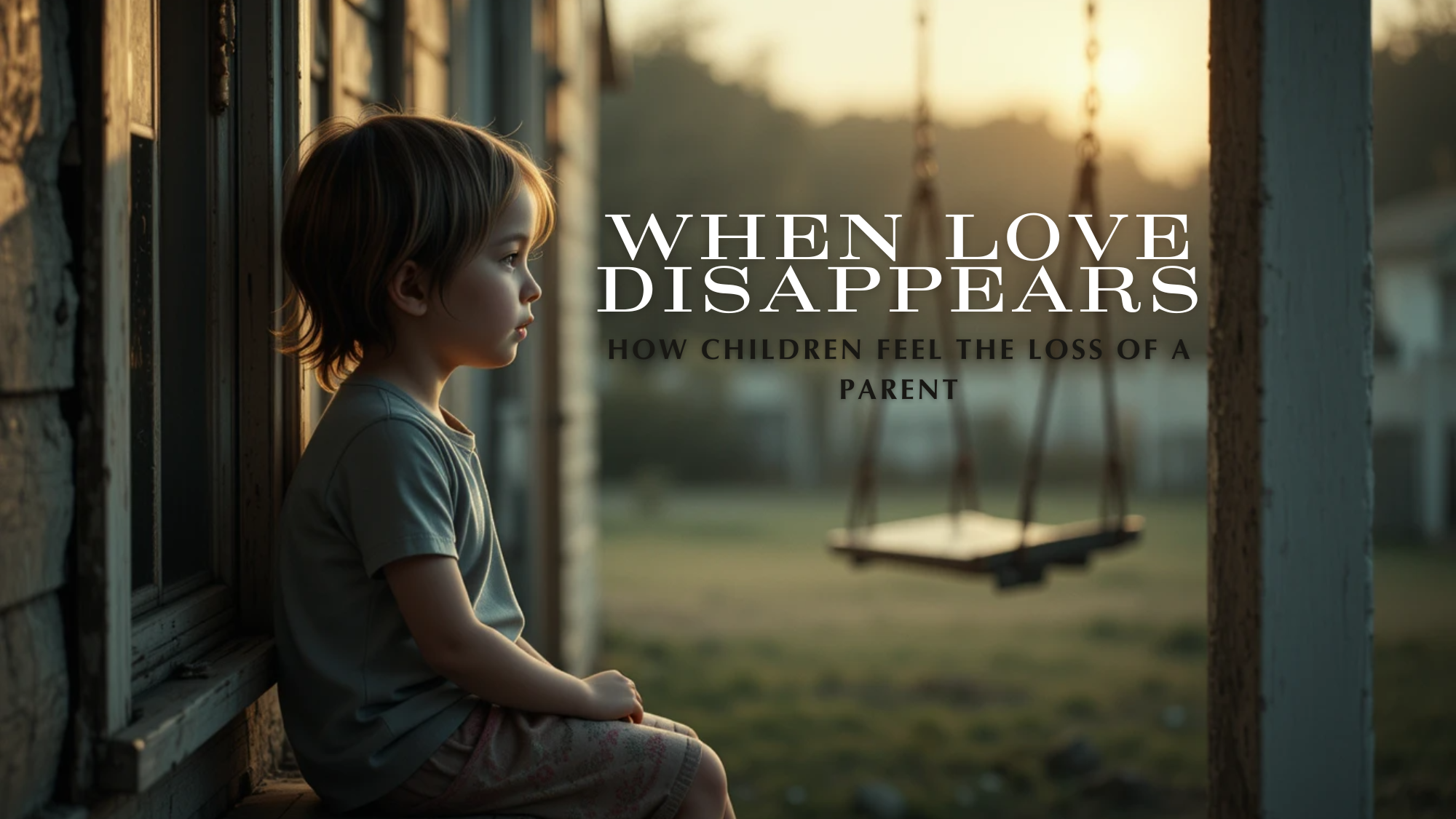When Love Disappears: How Children Grieve the Loss of a Parent | We’re Not Talking About That… by JBE Mindful Pathways

Grief isn’t always about what happened. Sometimes, it’s about who stopped being there.
Children experience the world through presence—through voices that soothe, arms that hold, and daily rituals that remind them they are safe. So when a parent disappears—whether through death or emotional absence—the child’s world shifts, silently and permanently.
It doesn’t always matter whether the loss was intentional or not. To a child, love that disappears feels the same. It feels like something is broken, but they’re too young to name what. It feels like their compass has been yanked away, and no one has told them how to walk without it.
Many adults separate death from abandonment. One is considered tragic, the other avoidable. But in a child’s heart, both leave the same emptiness.
Because either way, someone important stopped showing up.
Either way, they were left behind.
💔 A Quiet Story That Lives in Too Many Homes
She was five when her father died.
Too young to understand what death really meant—but old enough to know he was gone.
In the beginning, she asked for him constantly.
She waited at the door.
She saved things to show him.
She whispered “I miss you” into her pillow.
No one told her he chose to leave. Because he didn’t. But that didn’t stop her from feeling like he had.
And as the years passed, the questions turned into silence.
The love turned into longing.
And the longing turned into a kind of grief she didn’t know how to name.
By thirteen, she understood death a little more.
But it still felt like abandonment.
It still made her wonder if she wasn’t enough to stay for.
It still made her search for that missing love in unsafe places.
Because a child doesn’t stop needing love when the source disappears—
they just start looking for it wherever they can find it.
🌫️ When the Absence Has No Goodbye
Then there’s the child whose parent never died—just slowly faded from view.
No phone calls. No birthday cards. No apologies.
And somehow, that hurts in a different way.
Because the world around them doesn’t offer compassion for this type of loss.
There’s no funeral. No rituals. No quiet casseroles brought to the house.
Just questions.
And waiting.
And a gnawing silence where “I love you” was supposed to go.
This kind of grief gets buried under explanations.
“They were busy.”
“They live far away.”
“They don’t know how to show love.”
But the child doesn’t hear the reasons.
They only feel the empty chair.
And they often grow up believing they were the problem.
📖 A Quiet Story of a Different Kind of Grief
She was two when he stopped calling.
Too young to remember the last hug.
Too young to notice what was missing—
until the years made the silence louder.
At five, she asked why her friends had daddies at the school play.
At seven, she drew family pictures and left one corner blank.
At nine, she stopped asking.
Because by then, she understood.
He wasn’t coming.
He had the chance to show up, and he didn’t.
And yet, she still looked for him.
In the faces of kind teachers.
In the praise of strangers.
In every moment where she wished someone proud would clap for her.
By twelve, she’d learned how to smile through the disappointment.
How to laugh with a little too much volume.
How to shrink her sadness so no one would feel uncomfortable.
But inside?
She still carried his absence like a scar no one could see.
She told herself stories:
Maybe he doesn’t know how to love.
Maybe he’s just waiting until I’m older.
Maybe if I do better—be better—he’ll remember I exist.
But he didn’t.
And the birthday cards never came.
And the photos stayed unacknowledged.
And year after year, she learned that a father could be alive…
and still feel more gone than gone
🧠 The Lasting Echoes
Whether the parent is gone by tragedy or by choice, the result can echo throughout a child’s life.
- They may become overly responsible, trying to earn the love they lost.
- Or they may act out, testing if anyone else will eventually leave too.
- They may chase relationships that recreate the same pain, just to feel familiar.
- Or retreat inward, convinced they’re too much to love—or not enough to keep.
And even into adulthood, that child often still lives inside them.
Asking:
“What did I do wrong?”
“Why didn’t you stay?”
“Would I be different if you had been here?”
🕯️ What We Must Remember
Every child deserves to be loved—and to feel that love through presence, consistency, and care.
And when that love disappears, the grief that follows is not always loud.
It’s often quiet. Confusing. Misunderstood.
But it is real.
So if you know a child who’s lost a parent—through death or abandonment—don’t try to compare the two.
Just sit beside them in the ache.
Let them speak.
Let them feel.
Let them grieve someone who’s no longer showing up.
Because to them, the reason might not matter.
Only the emptiness does.
💐 Dedication
For every child learning how to heal from the loss of a parent—whether that loss came suddenly, or slowly over time. Your grief is real. Your pain is valid. And your heart is worthy of the love you didn’t receive.
— Juju Divine Empress
Be the first to comment